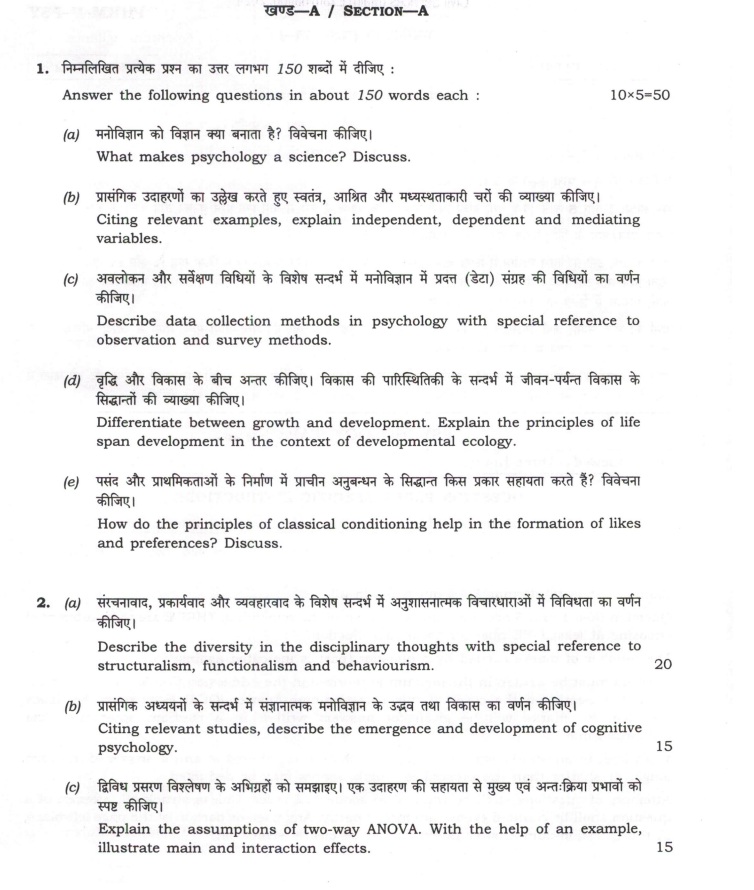(HOT) UPSC Current Affairs 2025 PDF
NEW! The Gist (NOV-2025) | E-BOOKS
(Download) UPSC MAIN EXAM : 2024 - PSYCHOLOGY (Paper-1)

(Download) CS (MAIN) EXAM : 2024 Psychology (Paper 1)
-
Exam Name : CS (MAIN) EXAM : 2024 Psychology (Paper I)
-
Marks: 250
-
Time Allowed : Three Hours
खण्ड -A / SECTION — A
1. Answer the following questions in about 150 words each : 10×5=50
(a) What makes psychology a science? Discuss.
(b) Citing relevant examples, explain independent, dependent and mediating variables.
(c) Describe data collection methods in psychology with special reference to observation and survey methods.
(a) Differentiate between growth and development. Explain the principles of life span development in the context of developmental ecology.
(e) How do the principles of classical conditioning help in the formation of likes and preferences? Discuss.
2. (a) Describe the diversity in the disciplinary thoughts with special reference to structuralism, functionalism and behaviourism.
(b) Citing relevant studies, describe the emergence and development of cognitive psychology.
(c) Explain the assumptions of two-way ANOVA. With the help of an example, illustrate main and interaction effects.
3. (a) Discuss the signal detection theory (SDT) with reference to perceptual vigilance task performance.
(b) Does punishment work in all situations? Discuss the pros and cons of punishment.
(c) Is reconstructed memory accurate? Describe the process of reconstruction, citing research evidence.
4. (a) Differentiate between classical and operant conditioning. Discuss their applications with suitable examples.
(b) How do various monocular and binocular cues help us with depth perception? Discuss with the help of examples.
(c) Differentiate between the processes of memory and forgetting. Also, discuss multistore model and meta-memory as innovations in the study of memory.
खण्ड - B / SECTION — B
5. Answer the following questions in about 150 words each : 10×5=50
(a) Citing research evidence, explain the components of working memory.
(b) What are the main differences between James-Lange and Cannon-Bard theories of emotion? Explain.
(c) Differentiate between intelligence and aptitude. Also, discuss the main features of a good intelligence test.
(d) Describe the biological and socio-cultural determinants of personality. Illustrate your answer with the help of Indian studies.
(e) Is cognitive dissonance effective in changing attitude? Discuss in the light of research evidence.
6.(a) How do heuristic and algorithm differ as problem-solving strategies? Illustrate the role of mental set in reasoning with the help of experimental evidence.
(b) Explain the biological and cultural bases of emotion. Do people reveal their emotions through non-verbal cues? Discuss.
(c) Explain the main components of emotional intelligence. What does the research evidence suggest about the role of training in its enhancement? Discuss.
7. (a) Distinguish between between psychoanalytic and humanistic approaches to personality. Discuss in detail the recent developments in the applications of these approaches.
(b) Citing relevant examples, explain how intrinsic and extrinsic motivation differ. Referring to relevant studies, describe the factors influencing intrinsic motivation.
(c) Discuss the functions of REM sleep and major theories of dreaming.
8. (a) How do Skinner and Chomsky differ in their approach to language development? Also, discuss the processes and outcomes of bilingualism and multilingualism in Indian context.
(b) Critically evaluate the positive and negative effects of modern computer technology and artificial intelligence on human behaviour.
(c) What advice would you give to a civil servant to reduce prejudice and discrimination in Indian society? Discuss.



